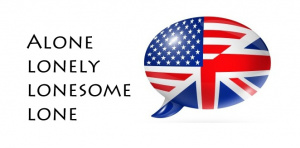Difference between revisions of "Language/English/Vocabulary/Alone,-lonely,-lonesome-and-lone"
< Language | English | Vocabulary
Jump to navigation
Jump to search
m (Quick edit) |
|||
| Line 24: | Line 24: | ||
*The only green thing was a lone/solitary pine tree. | *The only green thing was a lone/solitary pine tree. | ||
==Related Lessons== | |||
* [[Language/English/Vocabulary/Tongue-twisters|Tongue twisters]] | |||
* [[Language/English/Vocabulary/As-long-as|As long as]] | |||
* [[Language/English/Vocabulary/At-first-and-first|At first and first]] | |||
* [[Language/English/Vocabulary/Cause-vs-Purpose|Cause vs Purpose]] | |||
* [[Language/English/Vocabulary/At-Home|At Home]] | |||
* [[Language/English/Vocabulary/Along|Along]] | |||
* [[Language/English/Vocabulary/Top-Job-Interview-Questions|Top Job Interview Questions]] | |||
* [[Language/English/Vocabulary/Altogether-and-all-together|Altogether and all together]] | |||
* [[Language/English/Vocabulary/Most-Common-Greek-Roots|Most Common Greek Roots]] | |||
* [[Language/English/Vocabulary/Collocations-with-make|Collocations with make]] | |||
Revision as of 16:06, 26 February 2023
Alone, lonely, lonesome and lone
Alone means ‘without others around’. Lonely (and informal American English lonesome) means 'alone and unhappy because of it’
Compare:
- I like to be alone for short periods.
- But after a few days I start getting lonely/lonesome.
Alone can be emphasised by all
Example:
- After her husband died, she was all alone.
Alone is not used before a noun. Lone and solitary can be used instead; lone is rather literary
Example:
- The only green thing was a lone/solitary pine tree.
